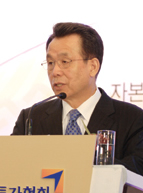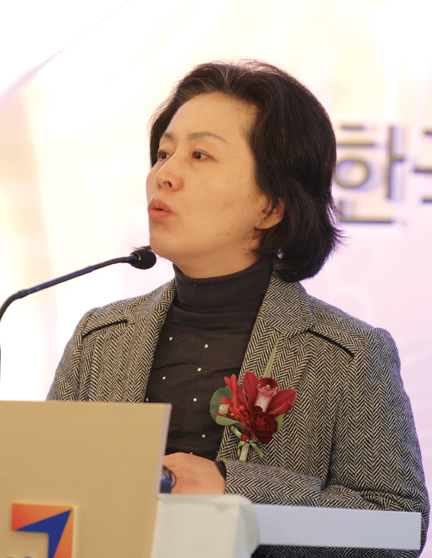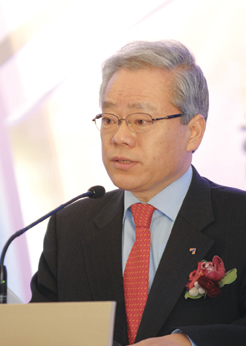Move Toward Stronger Financial Self-Regulation
Korea Financial Investment Assoc. launched with goal of making financial industry a key strategic sector

Chairman Hwang Geon-ho of the Korea Financial Investment Association said he will make the self-regulatory function of the new association strong by setting up standard investment regulations.
He said the association, created from the merger of the Korea Securities Dealers Association, the Korea Asset Management Association and the Korea Financial Futures Association, was launched Feb. 4 to coincide with the implementation of the new Capital Market Consolidation Act and will strive to make the financial industry a key area for growth in the future. Among the dignitaries present at the association's launching ceremony included Prime Minister Han Seung-soo, Chairman of the National Assembly Political Affairs Committee Rep. Kim Young-sun and Chairman Toshio Ando of the Japanese Securities Association, among others.
During the ceremony, Chairman Hwang said the most important matter is to create and maximize synergy from the merger. His first order of business would be to recover the public's trust in the capital market by resolving various matters currently in the way, such as the prior action to prevent the incomplete sale of financial derivatives. The new association's main role will be to monitor and mediate the problems that might arise among the nation's 212 financial companies.
Hwang said the association will publish a manual on standard investment guidance rules to greatly strengthen investor protection. In detail, the manual will have five steps in terms of risk guidelines both in offering investments to investors and the evaluation of risky products, so that every member firm will be on the same page. For such purposes, the association will launch the self-regulatory headquarters and the self-regulatory committee each led by a chairman with a three-year term of office.
Hwang stressed in particular the allowance for securities dealers to make payments on the securities they deal with under the new Capital Market Integration Law, which goes into effect in February. He said this matter should be allowed for the sake of resolving consumer inconveniences.


On the quality of foreign investors, he also said he will maintain consistent and close contacts with the government to push to have the Korea Exchange included among the world's advanced stock markets so that foreign investors can invest in Korean shares with a long-term view and not hedge against Korean stocks, taking advantage of the high liquidity of the Korean stock market. He said will make a special effort to have the Korea Exchange included in the Morgan Stanley Capital International, an advanced stock market index, as early as possible next year.
Hwang also denied the rumors that the new Capital Market Consolidation Law will remove all of the barriers dividing the financial industry, saying that the screens dividing banking, insurance and investment banking will not be removed and will be preserved as they have been.
He also denied that investment banking should not be the area into which the Korean financial industry should branch, as a number of large international banks went belly-up in the recent financial turmoil. He said a number of them went bankrupt due to their being highly leveraged, not because investment banking has inherent shortcomings as a financial business model.
The chairman also said the bond market is still in a slump because investor confidence still has not returned for bonds issued by private firms, especially those with credit ratings below A, despite the government's moves to stabilize the bond market. Bonds from firms with BBB credit ratings pose problems because investors will not touch them. But Hwang said the situation will improve as the economy gets back on track.
The Korean Securities Dealers Association also will do its best to revitalize the bond market. It will seek opportunities to introduce the ATS system for under-the-counter trading of bonds. He said the system will go a long way in ensuring the expansion of the bond market, whose growth has been hampered by the regulations that ban the trading of bonds outside the securities market. The system will free up bond transactions, which have been dependent on private 'messengers.' In this connection, the government should be more flexible in its policies toward the bond market, taking a lesson from how advanced countries operate their bond market. Bonds are traded through middle-men, mostly on a one-on-one basis, a practice that needs to be revised for transparency and liquidity.
Hwang also called for investment banking to be self-regulatory, unlike commercial banking and insurance operations, as the new Capital Market Consolidation Law has softened various regulations on the financial industry since Feb. 1, the date it went into effect. nw
Dignitaries cut the tape to officially open the Korea Financial Investment Association Feb. 4. They include Prime Minister Han Seung-soo, 6th R, and Rep. Kim Young-sun, chairman of the National Assembly Policy Committee, 5th R, Chairman Hwang Geon-ho of the association , 6th L, and Vice Chairman Rhee Chang-yong of the Financial Services Commission, 5th L, among others.
Prime Minister Han Seung-soo delivers a speech at the opening ceremony of the Korea Financial Investment Association.
Rep. Kim Young-sun makes her speech at the opening of the Korea Financial Investment Association.
Chairman Hwang Geon-ho of the Korea Financial Investment Association delivers speech at the opening of the Korea Financial Investment Association.
3Fl, 292-47, Shindang 6-dong, Chung-gu, Seoul, Korea 100-456
Tel : 82-2-2235-6114 / Fax : 82-2-2235-0799